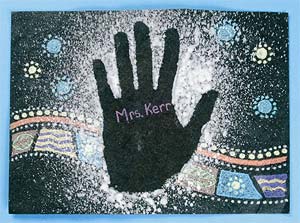Aboriginal Hand Prints
Aboriginal Hand Prints
(art + history; art + social studies)
"One old man in Arnhem Land remembered being carried as a child on his father's shoulders as his father climbed up a log leaning against a rock wall. His father then sprayed his hand with red ochre against the rock, leaving a stencil he could still recognize many years later. The main function of the stencils was to record people's presence and association with a site." — Aboriginal Art Online
Grade Levels K-4

The stenciled hand print and aboriginal style drawings help children to relate to the man from the Australian Aboriginal Culture stated above, while helping them to understand the use of line in art. A black paper with white splattered paint was used, but white paper with red (ochre) splattered paint would make a nice impression also. Construction paper crayons make bright, bold, linear designs around the hand stencil.
Preparation
1. Mix paint in an atomizer bottle. Use about two parts paint to one part water. More water may be needed in order for it to spray without clogging.
2. Display several examples of Aboriginal art. Suggested resources:
- Crystal Art Portfolio Prints, set of twelve 16" x 12" prints. Aboriginal Art Set 1 (72243-1001) or Aboriginal Art Set 2 (72243-1002)
- Aboriginal Designs Clip Art Book (71300-1015)
3. Discuss the use of line in Aboriginal art: long, short, curved, straight, thick, thin, loop, zigzag, and dot.
Process
1. Using the drawing paper, students trace their hand with a pencil and cut out the shape with scissors.
2. Loop a piece of tape to make it sticky on both sides, then attach the paper hand to the center of the black construction paper.
3. With the atomizer bottle, spray short bursts of paint around the hand until the outline is visible. Allow drying.
4. Remove the paper hand. Students decorative around the hand stencils with construction paper crayons, creating Aboriginal designs with a variety of lines and patterns.
Materials
Blick 80-lb Premium Construction Paper, Black, 12" x 18" sheets (11409-1006), 50-sheet package, need one sheet per student
Blick White Sulphite Drawing Paper, 80-lb (10209-1043), 9" x 12" sheets, need one sheet per student
Snippy Scissors (57040-1005), need one per student
3M ScotchTM Magic PlusTM Removable Transparent Tape (23002-1501), need one roll per classroom
Blick Premium Tempera, White (00011-1007), quart, need one per class
Atomizer Bottles (02912-1003), share five across the classroom
Crayola® Construction Paper Crayons, (20117-0019) 16-color set, share one between two students
Blick Economy Graphite Pencils (20302-2009), a box of 12 pencils, need one per student
Blick All-Purpose Newsprint, 12" x 18" (10204-1007), package of 50-sheets, need one sheet per student
National Standards
Content Standard #1 — Understanding and applying media, techniques, and processes
K-4 Students use different media, techniques, and processes to communicate ideas, experiences, and stories
Content Standard #3 — Choosing and evaluating a range of subject matter, symbols, and ideas
K-4 Students select and use subject matter, symbols, and ideas to communicate meaning
Content Standard #4 — Understanding the visual arts in relation to history and cultures
K-4 Students know that the visual arts have both a history and specific relationships to various cultures
